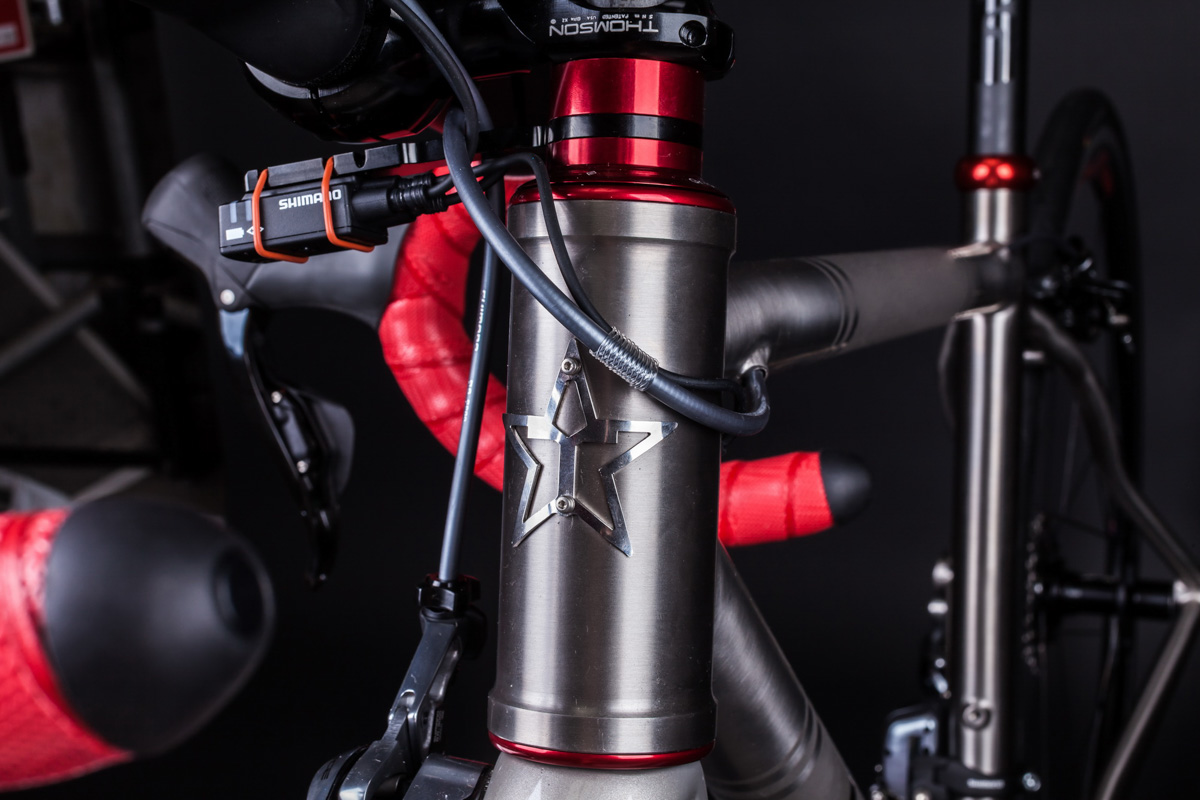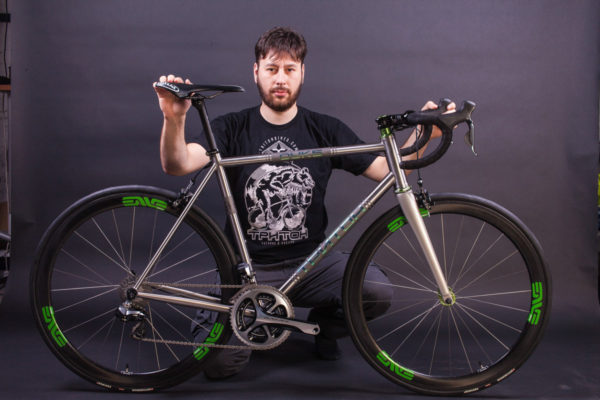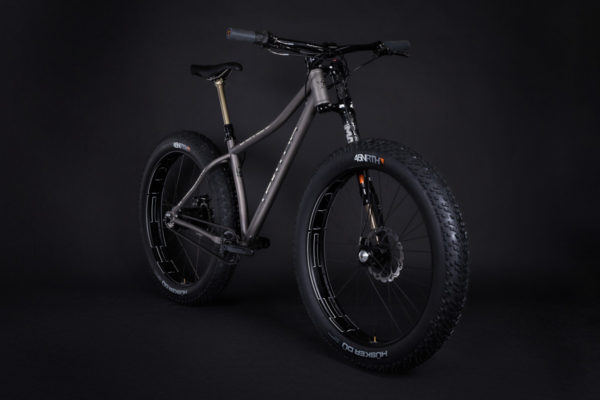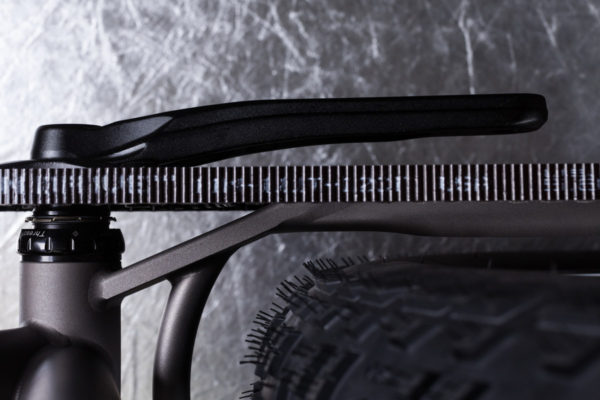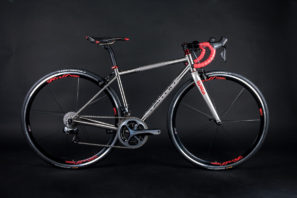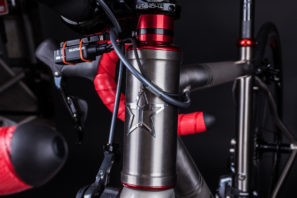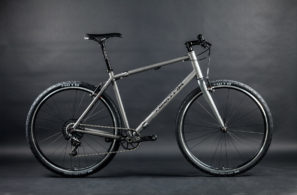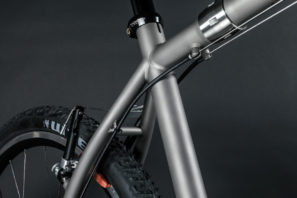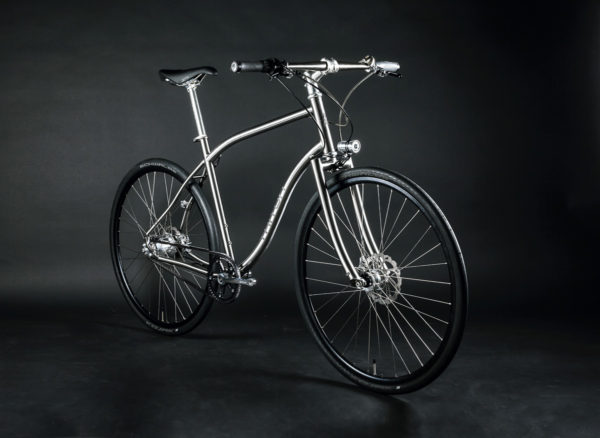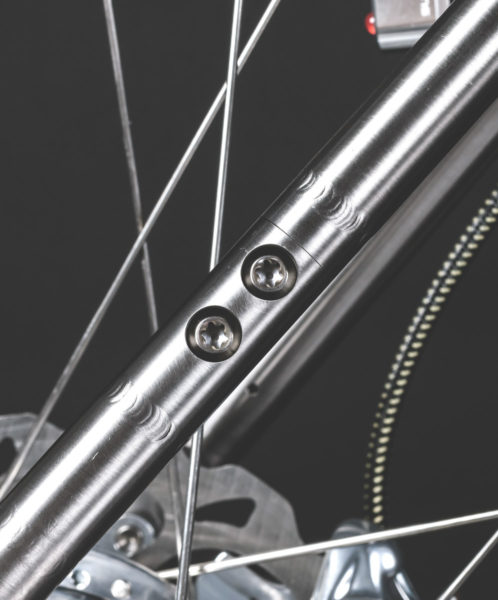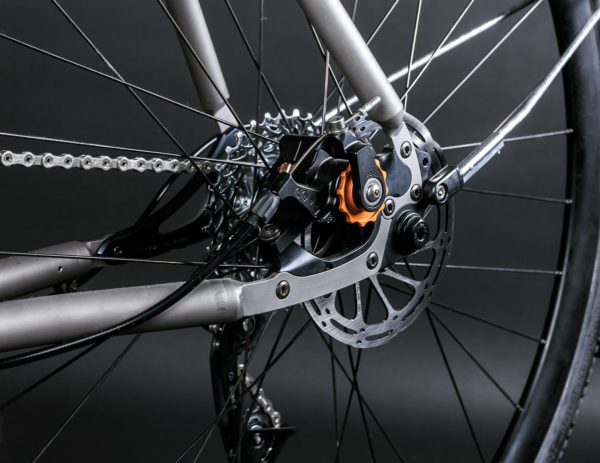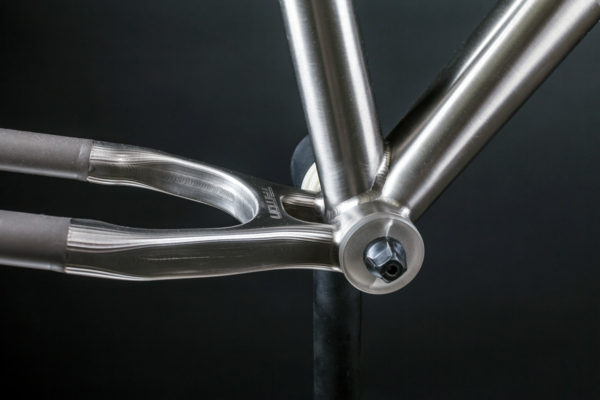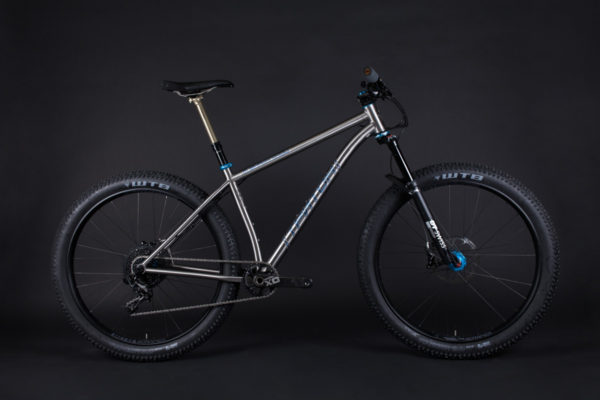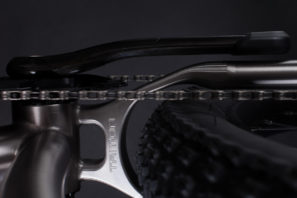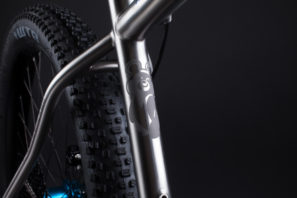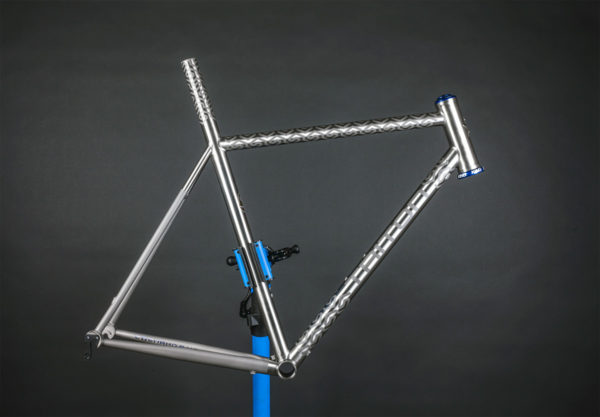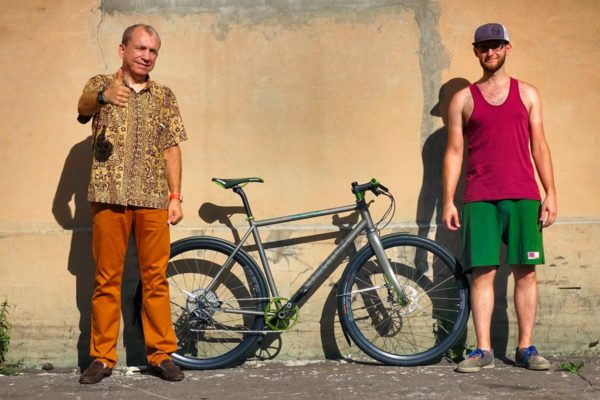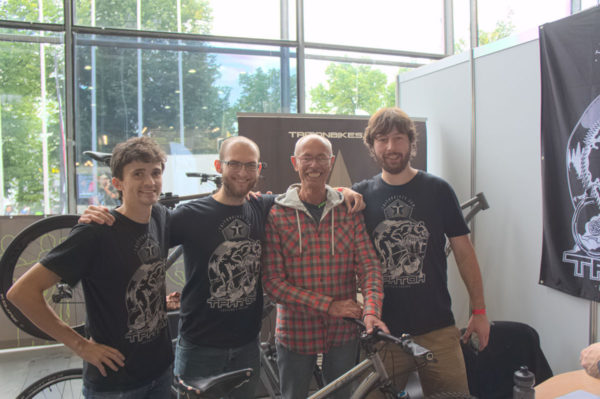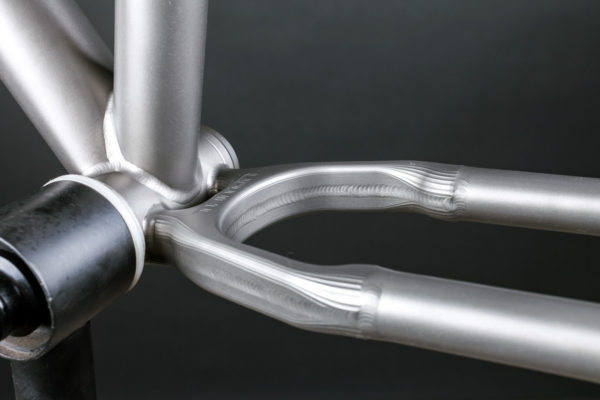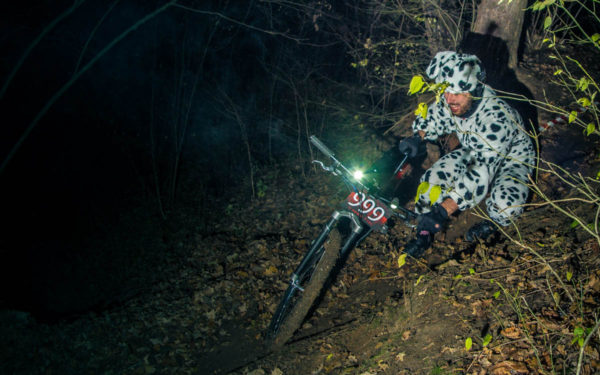With framebuilders representing Japan, Ireland, England, Korea, and so on, this might be the most international NAHBS to date. But what is probably most surprising is the apparent onslaught of builders from Russia, a country not well known for its framebuilding tradition. Leading this invasion is Dmitry Nechaev of Triton, who our readers will remember from our interview last year and who NAHBS 2016 show-goers will remember from the Soviet era military surplus hats he sold to help finance his trip.
As we learned from this entertaining interview with Dmitry over Skype last week, the Russian framebuilding landscape is unique- very different from the one builders take for granted in the US. The industrial infrastructure and manufacturing legacy from the USSR, as well as the economic repercussions as a result of its collapse, continue to both positively and negatively affect the every day lives of the few, though resilient, framebuilders in the country.
Because of this unique economic and cultural environment in Russia and despite being physically removed from the relatively accessible bicycle economies of Europe, Asia, and the US, Triton has found its place. The titanium company has designed and put into production several proprietary yokes to help to differentiate their frames in the global marketplace. They’ve also continued to expand their international presence, now selling to 37 countries worldwide. As Dmitry hints in this interview, big things are on the horizon for the Moscow company…
BIKERUMOR: What makes you unique, aside from being Russian, is that you actually have a background in business. A lot of framebuilders come into it differently.
DMITRY: We discussed this last time. I don’t want to say something for the second time, or say something totally different.
BIKERUMOR: So… you’re changing your story. Is that what you’re saying?
DMITRY: One of those, right? The political situation is changing. You now have new president. I have to change my words.
Let’s just try. If you see something that is totally not good for US audience: remove it. I’m okay. We’re used to people not letting us say something, so it’s okay.
BIKERUMOR: That’s going to be such a good introduction! So, you were a trials rider and you ended up in the UK.
DMITRY: Studying English for summer school, yes. I think I told you that most of the knowledge of English I got was not from the school, it was from the conversations I had with the guys I was riding bikes with.
BIKERUMOR: That’s the next sort of line of questioning. Cycling in the US- there have been these on again, off again romances with cycling. We have a lot of cycling infrastructure currently. In the 50’s and 60’s there was intense romanticism around cruisers in the larger culture. In the 70’s there was touring. Et cetera. So, I guess what I’m asking is what is cycling in Russia? I know that’s broad but I just don’t know.
DMITRY: Oh shit… You know, as I’ve said, everything is new here. Everything is just beginning. It’s the same with cycling. I think we’re actually closer to the US than we are to Europe in terms of cycling culture. In terms of how many people ride, we have less than Europe. But we have a lot less than the US, unfortunately.
BIKERUMOR: In terms of riding, in terms of framebuilding, these Soviet bike frames tend to manifest over here. They are very interesting- very popular in some circles. I know there is a tradition of fantastic athletes in the sport from the USSR, but I don’t know as much as I’d like to about bicycles there.
DMITRY: Yes, Takhion track bikes for example. The thing is that there were a few bicycle factories in the USSR that came to an end when it all collapsed. One of the best factories was in Kharkov (Kharkiv) in what is now Ukraine. They had everything, they were building frames for the Olympic team and everything, but it’s all gone.
Almost all the new framebuilders from Russia that you see, they basically had to start from scratch. There are a few guys now coming- this year I told the guys, “Hey, [Triton] tried it. Let’s bring some more Russians in.” Now there is Anton from Toresvelo. There is also Andrei and Evgeny from Jam bikes. There will be three Russian framebuilders in total.
We have maybe ten [independent] framebuilders total in Russia.
BIKERUMOR: What? Wow. So few.
DMITRY: Yes. This number specifies the culture. Let me tell you why. Twenty-five, twenty-seven years ago it was USSR, right?
BIKERUMOR: I mean, you were there. You would know.
DMITRY: Right. I was born in USSR. The thing is during USSR there were no private businesses. All businesses were state owned. The state wouldn’t want anyone to do business because there was no taxation, no privately owned anything. People did things in their garages for fun, but they would not be able to sell anything. Which means there was no competition to develop the whole thing. People would just make things for themselves.
These guys were crazy guys in their garages. Like in the US, there were people that did crazy things with their welding machines and machines and everything. You could find almost everything in Russia, like the tubes. Some people would just steal it from the factories… well, they worked for the same factory.
You know, there is a common thing in Russian, like “Hey, you need this part for your bike? Just come to your closest-” it used to be like this ”-come to your closest factory or machine shop, just come after the break and give the guy some money or a bottle of vodka and he will machine you this or that.” We used to have that.
BIKERUMOR: Ha, I have that kind of deal with Erik Noren, but it’s with whiskey.
DMITRY: Ha, I know this guy. I could imagine that. So imagine there is this whole country, every machinist is Erik Noren.
BIKERUMOR: Oh no!
DMITRY: See? This is why we collapsed. You come there, you drink Vodka, he makes you something, you leave, you’re both happy, and nobody works. So the country collapses itself. It’s a huge black hole.
BIKERUMOR: You said that there were all these garage builders… were they tinkerers? Did they consider themselves craftsmen outside of their factories?
DMITRY: There were people who worked at the factories, the professionals, they became the best craftsmen. But they could not sell this, so there was no reason to continue after you had done a bike for yourself or your wife- it never developed. But people did some crazy things. I had a machinist who had over 40 years of experience. He was what we called the “Soviet Style Machinist.”
BIKERUMOR: What does that mean?
DMITRY: That means that he grew up and lived in times where you could not get anything as a final product. You could not go to a store and buy a rear derailleur easily. You had to look for it. You had to find it somewhere. You couldn’t get the axles for the hubs. You couldn’t get the chainrings or anything. So people would start making them for themselves or for their friends. It was kind of a small business, but it wasn’t legal. So when we say “Soviet Style Machinist” we mean that the guy knows how to make things but they look kind of ugly- but they are super efficient.
I have a somewhere a titanium track pedal made of one piece of titanium in the 80’s by some guy at the factory. It was ordered by some track team in the USSR. It looks nice. It’s a really old pedal, nicely done. They had to do this because they couldn’t buy things, so they had to make them. This is actually how a lot of really nice and professional people appeared in Russia because it was the same for motorbikes and cars. People would make things for their cars so they would last.
So my machinist’s bike, he had a Triton… unfortunately he got killed by a car last year- it was a bad accident. He lived an interesting life. When we made him a Triton frame, he still machined a nice titanium superlight kickstand for it and machined some special rack for it with some things that you could not buy. There were and still are this type of people who can do anything and they still haven’t switched to the economy that we have right now. There are still people willing to make things even if it makes no sense. I try to approach it more in a strict and economic way. If it is easier to buy and cheaper to buy, I would rather buy it. They are more the type you would like, I think. They would rather make it.
The difference is that they worked for the factories and the machine shops in the USSR. They all had fixed revenues, fixed salaries. Most people had the same salaries. There was no competition among the people, so they didn’t care how much time they spent on a certain thing because they didn’t pay the rent, the electricity bills, anything.
You ask me this and I’m just trying to realize that there is a completely different world here. It was obvious before you asked me, but now I’m realizing that it is totally different to the US. In the US you have Paragon Machine Works and they’ve been there for over 30 years. It’s impossible here. There is not a single privately owned company in Russia that is older than 27 years. It can’t exist. Everything that was there was either state owned or kind of illegal. It was nice- you could see some crazy things. My machinist machined a pen gun for himself because in the 90’s it was really dangerous to walk in the streets and it was illegal to carry gun, it still is. He machined a pen gun with a tiny little bullet. We tested it once at Triton. We had a wooden box from the Anvil jig and it went all the way through walls of this wooden box and it got stuck in the brick wall. This thing is like a little tiny pen. It was so nicely machined. You couldn’t buy these things in Russia- you had to make them. In these terms, the culture was pretty great. It was lacking the visual part. [In deep Russian accent] “You know, Russians build TOUGH things. They don’t need to look good, they need to look dangerous.”
BIKERUMOR: I think that it doesn’t really matter if- I’d love to see what a Russian version of NAHBS would look like. I think it would be very interesting.
DMITRY: Well, there are two basic types of framebuilders, basically. One is like me and Anton and Jam Bikes. We are more modern type. We are more like US/European framebuilding shops. However, there are people that build all these cruiser bikes- fancy-looking, slow, but nice looking bikes. Cruisers and beach cruisers and all that. These guys, they look totally different. We are more like cyclists, they are more like punk rock, dirty clothing- well, I’m also dirty right now. They are different people. You would see some interesting ideas there. I think in this case, in terms of cruisers, US provides more. They still look at US made projects. The US is the place where the whole thing started.
BIKERUMOR: When you’re saying there are ten builders, there are still big companies, right?
DMITRY: When I say ten builders, I’m talking about firms like us, from one builder to twenty people. There are of course bicycle companies. There is a bicycle company called Stels. They make and import up to two million bikes a year into Russia. They have three factories in Russia and they also import a lot from Asia. They are the biggest one. They have now signed with the world’s largest producer of aluminum, Rusal, to supply them 1 million tons of aluminum.
The total number of bicycles sold in Russia is 4.5 mln units annually.
BIKERUMOR: One million tons!
DMITRY: Yeah. They now only make steel Hi-Ten frames in Russia, but they want to build aluminum frames in Russia. Because the ruble is so low now, their aim is to build aluminum frames 30% cheaper than in China because they have support from the state, just like any Chinese company, right?
BIKERUMOR: Yeah… people never talk about the subsidies. So in Russia you have the same thing, that’s awesome.
DMITRY: They say if they do it and we can do it locally, why not do it locally?
But yes, there are 20-30 Russian brands that you don’t know, but they exist. Wow, you don’t know ANYTHING. You don’t know anything, Anna!
BIKERUMOR: (laughs) But this is why we’re talking! You know, I went to England last year for Bespoked and I was stunned to see that framebuilding looked completely different. This year for NAHBS, I saw that there were many international builders. I thought, wow, if framebuilding looks so different in the UK, I wonder what this looks like in Russia! And the answer is: everything is really new. You don’t really have this framebuilding legacy like we do in the US with independent builders who have been at it for thirty, forty years in the same way.
DMITRY: We had kind of a Richard Sachs here, his name was Samoilov. He’s the old guy that used to have a shop in Moscow. Well, the guy’s dead now. He was just very old. He did race. He did make bikes for some fast guys in the USSR.
But yes, if you take the whole thing and compare it, it is so much smaller. It is a lot of stress to do it from here. It is too far.
BIKERUMOR: Here you are in Moscow where you don’t have the benefit of our insane infrastructure. We’ve got a great a great infrastructure with Paragon, Anvil, PAUL, White, Phil Wood, Chris King- all these companies are right here. We have all these distribution entities. You can get everything in a day. I know you have an Anvil fixture- though I can’t imagine that it was that much of a problem because Don ships everywhere and he has his shit together.
DMITRY: The thing is that although we are far, there is business here. Now it exists. It is complicated. Our bureaucracy is a little bit too complicated. It is a lot more complicated, as I have experienced, to start a company in Moscow than it is the US. You have to know more, you have to ask more people to help you with the paperwork. But once you’ve done it, it works.
As far as the shipping is concerned, it’s pretty easy. I think all the Anvil stuff invoiced was ten or eleven thousand dollars, and it was another thousand dollars to ship, so it wasn’t bad. Ten or nine percent of the invoice price.
BIKERUMOR: I’ve noticed that you’ve started- we’ve got frame parts that are so easy to get. You’ve started machining your own yokes. This is why I started down this line.
DMITRY: This is the reason. We are far, so sometimes it is easier to make things than it is to buy them. See, you compare the price and the time and if you need this. You calculate and you realize that the Paragon Machine Works headtube is nice, but it is like $115. My frame is around $2000 for a titanium frame, which is very affordable. If I use all the Paragon parts, it makes the frame a lot closer to the US price. We are between Asia and the US in terms of pricing. I think that we are a lot closer to Asia for price, but much further in terms of quality. Thanks to Russia, we have titanium here. As far as headtubes and bottom bracket shells and seat tube inserts, it is a lot faster and better to make things here, in the shop, or order it from the local suppliers. I think this adds to how different the product is. As one of my Engineering friends said, remove a brand or decals from a Titanium frame, and if it using Paragon parts, you cannot distinguish what kind of frame it is. We still buy a lot of Paragon dropouts and we use them. They are the best. But if I can make something and it makes sense, I will do it. It is a matter of calculation.
Shipping is easy. Apart from frames, we build complete bikes. I have OEM and builder accounts with over 40 US companies. Chris King, Enve, PAUL Components, Phil Wood, Onyx, White Industries, Thomson- they don’t ship to Russia. I have a slot in a warehouse in Brooklyn. These guys ship to Brooklyn. And then I have a slot in a cargo plane going to Moscow every Friday. I have huge boxes arriving every week. The whole thing takes ten days.
BIKERUMOR: Ten days isn’t bad.
DMITRY: That’s it! That’s the thing. The whole thing takes about two weeks. So I’m not that far in these terms. I’m pretty close. Also, if there is VAT- there is no VAT for me because the companies are exporting. Well, it depends on the state. It’s a lot easier, it’s interesting, it’s a lot easier for the US than for us to work with European companies.
BIKERUMOR: Really!
DMITRY: Europe, Europe has VAT. If you ship from Germany to Russia, you ship through Estonia, Lithuania, it makes the process so expensive that if I have to choose between US and European parts supplier, I choose US build. It may be heavier and overbuilt, but I trust it.
You know, I write to Chris King and they charge my card in seconds and I immediately see something that ships. Same with Paragon. I don’t mean to be offensive, but with Italian guys it’s going to take two weeks to have everything done.
BIKERUMOR: If you’re lucky.
DMITRY: Yeah! This is actually what pisses me off. The whole framebuilding society is dependent on a couple of Italian companies making tubes. I know these builders would like to have things from the US.
BIKERUMOR: Shipping isn’t that bad, then.
DMITRY: No! I don’t know if I said this before, but shipping a frame from Russia to the US with EMS, which is 5-7 days, sometimes three days, how much do you think that is?
BIKERUMOR: I would assume a ludicrous amount of money, but based off of how you’re phrasing that I feel like that would be incorrect.
DMITRY: $65
BIKERUMOR: What?!
DMITRY: Yes. $65. This is one of the reasons we’re kind of more positive about what’s going on with us rather than some US builders. Some things are more complicated to get and further away, but there are other things that are really cheap, like shipping. On my site, shipping is including in the custom frame cost. For some reason, they haven’t updated the pricing in four years. They know the economy is down so they aren’t raising it.
Also, what is letting us develop, since we’re in Russia and there are remains USSR, and USSR was a huge and strong country, it had its own Ministry of Machines. There was Ministry of Tourism. There was Ministry of Culture. And there was Ministry of Machine Industry. Not cars, this was different. They had a state entity that controlled the production of mills and lathes and drills and all these things.
They were making machines in almost every large town of our country. The country was huge, and still is, there were so called… fuck, I don’t know how to say it in English. The factories were huge and you’d need a place to live and work. They were building huge campuses and huge factories in a field. This made the whole economy work. Because they were working there, they needed to put their children in kindergarten, needed hospitals- but the whole economy started in the middle of nowhere. Now it is down because many of the factories stopped.
You know like Las Vegas was a town created in a desert? We had the same but with factories in the middle of nowhere, which then formed huge cities. When you read on the machine you can see where it was made. It could be made somewhere really far. But every large city would be making its own machines for its own production. There would also make lathes and mills, all the standard machines. And there are still remains of this.
BIKERUMOR: So from these factory towns you have these big, robust, soviet-era machines that will never break everywhere.
DMITRY: Russian cars suck, but the machines are good. I’ve also heard that the machines that we use are also popular in the US that there are things they can do that the US machines cannot. In terms of metric and Imperial, our machines can do both. And the parts are cheap.
In this case, if you’re making frames, it’s making more sense. You have more freedom. My shop that I run right now I consider expensive.
BIKERUMOR: So you have access to government subsidized materials-
DMITRY: Well, not titanium. We just have a lot of it.
BIKERUMOR: Why so much?
DMITRY: Russia is the world’s largest exporter of titanium. Boeing is one of the largest consumers of titanium. Russia supplies most of its stuff to Boeing, Airbus- all these aerospace companies. And then… we kind of use the leftovers. There are some tubes that match the spec of the tubes that we want. There are some tubes that we cannot get- all the thick wall tubes that we get we try to get from Russia. For thin wall tubes, we have to get them from Reynolds or Dedacciai or Asian suppliers.
The yokes that we make, they are made of Russian titanium.
BIKERUMOR: When you machine, you have all these leftovers from Boeing to work with.
DMITRY: Exactly. When I try to export it, they told me I would not be able to because it is a dual purpose material. If I ship it as a frame, it’s okay. If I ship it as raw materials, it would have issues in customs.
BIKERUMOR: But if you wanted to design and sell your own dropouts and yokes…
DMITRY: It’s no problem, absolutely, but I would not do it. It makes no sense. I’ve been asked about it.
BIKERUMOR: Unfortunately, everyone is looking for the Paragon alternative, because they don’t want to look like every other titanium builder.
DMITRY: Exactly, exactly. Another good idea is to order your custom design dropouts and parts from Paragon: many companies and builders do it. You just have to invest a bit.
BIKERUMOR: You’ve got kind of a rad operation over there. You have titanium frames that are very custom for you. You’ve got great access to materials. You’ve got access to cheap shipping and low cost spaces.
DMITRY: We’re still not going to become millionaires if we still do this in these kind of numbers. There are still taxes. We’re not as cheap as China for sure.
BIKERUMOR: But you’re much cheaper than the US.
DMITRY: To be frank, I know some people from the US that I could talk privately to. We make our own benders, but it is five times more expensive in the US. I wonder how some people would survive because some prices are too high. You know, I’m kind of a punk. I’m not organized well, and it’s still working out.
BIKERUMOR: And you employ people.
DMITRY: We’re at ten people total so far. Last year, I think we were at seven. It’s not ideal. Sometimes when you have to pay the rent and the salaries and you have to buy titanium, and if it is all at once, you get less money than you need. It isn’t stable yet. We’re enjoying this too much than working super efficiently. Thanks to economy, it’s also easier to afford good people here. It’s good news for them, but better news for me.
Since I have a little bit of financial background and I have friends from there, they always try to help me. I say “Hey, fucking hell again, I have no money to pay the rent or no money to do this or that.” They say “Hey, can I help you. Let’s just calculate it.” We used to meet. We made a financial model of Triton and saw where our problems were and the bottlenecks are and some of that required investment into tools. Some tools are very expensive, like, you can buy a USSR lathe but you cannot buy a bead blasting chamber. This has to be new because they didn’t make this type back in the day. So we calculate how much money we needed.
Then we were approached by potential investors who said, “Hey, how much money would you need to do this properly, to do large numbers- like ten times more.” We sat down and calculated that. Immediately, there were some people asking us, “We are interested in your company.” In terms of how we do it internationally- there are a few firms like us in Russia, but I think we are more internationally connected.
BIKERUMOR: I think I saw somewhere that you’ve got product in 35 countries?
DMITRY: Since last Sunday it’s 37! We just had an order from South Korea. We added South Africa or something else, I have to check. I have an Excel form for that too. So now we have been approached by technological investors who will help us to use the cheap material economy in Russia to expand. The guys I’m going to work with soon are professionals- I cannot say too much. The idea is to combine the forces.
BIKERUMOR: Basically, big things are happening with Triton. You have your current factory, which is going alright, but this isn’t the terminal arrangement. You’re an ambitious guy.
DMITRY: I look at it this way. I’m 32 right now. In Russia we have a saying: if by 25 you aren’t married with two kids and a BMW X5, you are a loser.
BIKERUMOR: You have a BMW X5?
DMITRY: No, I have Landrover. So I am a loser. But I have two kids. It’s a joke… mostly.
BIKERUMOR: It’s a very Russian joke.
DMITRY: Yeah, yeah, yeah. But life is faster here. People die earlier and people learn the life of a grown up very early. Some people quit school and start doing something to survive, to provide to their families. I compare this mostly with Europe. When I studied in Europe initially, I was 23 and there were 33 or 34 who still lived with their parents who hadn’t yet started their careers.
BIKERUMOR: You’re also describing the US.
DMITRY: Yeah, but that was Europe. Right now, that’s alright with me. It’s people’s choices. I don’t care. It’s not my business.
For us as Russians, as ambitious Russian students of the age from 22 to 24, this looked ridiculous. Our life is so fast here that you have to move fast and you’re a loser if you’re 33 and you still live with your parents. It is a tough belief here, it is just how the life is here. So I’m 32 and I have this shop and I want to go bigger. I want to take some extra height. I can see some old hairs on my head and I have a lot of stress here sometimes.
I’m making the whole thing work where as we do sell a lot of stuff outside Russia, the Russian customers have become a lot more poor in the last two years. We kind of lost this market because our frames are too expensive for the local customers, even if we give some local discounts because they don’t have to pay taxes and shipping, the frames are still expensive.
BIKERUMOR: What are you bringing the show this year? Last year, you were probably already machining things or getting set up, but you didn’t bring anything to the show that was custom. You started your yokes a little later.
DMITRY: Yeah, we brought yokes but we didn’t bring a frame with the yokes.
BIKERUMOR: Did you tell Mark Norstad about this project? I know you kids were hanging out before the show.
DMITRY: Yeah. We have two yokes. One is 2.5in. One is 3in. The 2.5in was inspired by the Paragon yoke. We had to draw it from scratch, but I did ask Mark to make this for us but it was just a bit too expensive for us to handle because we would have to order a lot. We designed our own one and it appeared more affordable and we just did it locally. He liked it. He held it, touched it when we stayed with him last year. Mark could have killed me while I was asleep but he didn’t.
BIKERUMOR: There was a little stir when you launched those yokes. “He stayed with Mark and then he turned around and launched those yokes.” But Mark is pretty straightforward.
DMITRY: Each month I buy maybe 1.5 or 2 thousand dollars in dropouts or parts. I give Paragon some business. But when we first showed this yoke in the public in the Instagram I mentioned them. I said, “So we made this 2.5in yoke that is not made by anyone and it is inspired by the Paragon yoke.” I mentioned Mark and he was okay with it because I discussed it with him over email. They still haven’t made something like that. We have already built over forty frames with this yoke and they are all over the world. I would not be able to do without it. I would have to give people smaller tire clearances, smaller drivetrain clearances without it.
I know what you mean, it’s kind of, yeah… I can surely say we were inspired by his work, it’s just that their parts, they didn’t fit our needs and they wouldn’t be able to supply our needs on the price that we could afford.
BIKERUMOR: And Mark knew it was coming. You kids are friends.
DMITRY: We are friends. We discussed it a year in advance. A year before the show. Our 2.5in yoke for 2.5in tire is even slightly heavier than their semi-fat yoke because our yoke is a lot thicker and has in some places a lot more material.
BIKERUMOR: Is that because it’s Russian? Because that’s how you do things?
DMITRY: This is the Russian way! We made it just a little overbuilt. It’s stiffer than the Paragon yoke. It doesn’t mean that yoke is bad, we just made our own thing the way we feel. Of course, it’s a yoke. It looks really light because it is made out of two shells that are welded together. You wouldn’t believe how many inquiries we get for this yoke. We wouldn’t sell it.
Now we have 3in yoke but it is different with different tire clearances. It is thicker and stiffer. I will bring one bike to NAHBS with this yoke. 27.5+ bike with the ENVE rigid fork. Anodized decals. Everything in Russian. We built it for a Russian rally racer driver who is also a passionate bicycle rider. He has a number of bikes and he loves his Triton. The problem is we wanted to bring a really nice cross bike that has a really nice painted TRP and the customer didn’t let us take it. He says, “No, it is too far. Moscow is okay but not US.” Everything is nice, Chris King blah blah blah, White Industries, so many American parts! But he would not let us bring it.
We are also going to bring our friend’s S&S coupled city bike. Classic looking with the Sykes wooden fenders made out of cherry wood. It’s got belt drive and Rohloff drivetrain and Formula brakes.
BIKERUMOR: Rad.
DMITRY: Now there are three framebuilding companies from Russia for this NAHBS.
My hope is that there will be more in the future because in the current crazy situation that we have in politics, I feel that only business and passion for bikes, for anything- positive thinking people will be able to keep this peace on this planet.
I believe that my part in this, when I’m going to NAHBS, I’m trying to show that we are cool and we also think that you guys are cool. We share the same passion. A lot more than that needs to be done, but we are in the right direction. Fuck the war. Let’s go ride bikes.
Interested in learning more about NAHBS 2017 in Salt Lake City? Check out HandmadeBicycleShow.com
